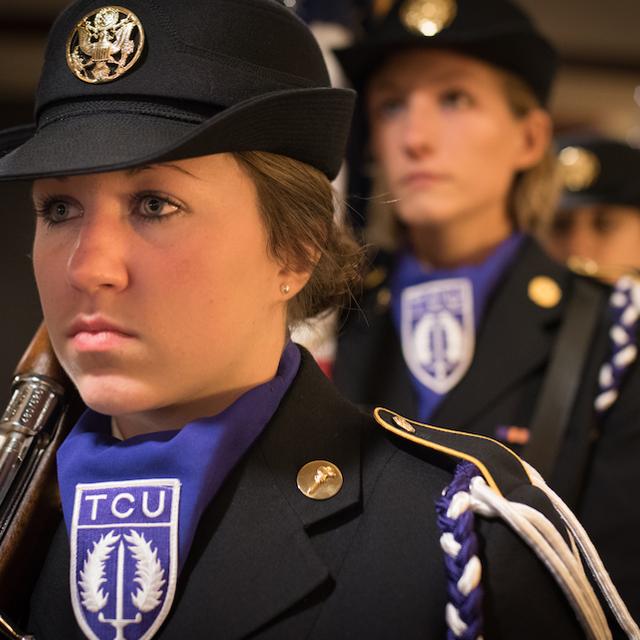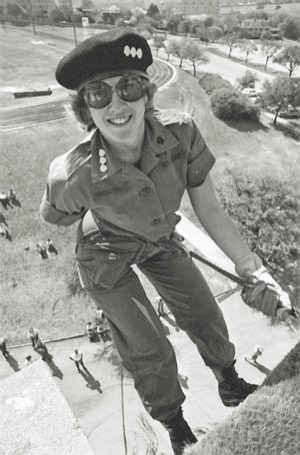
Equal Opportunities to Lead: 50 Years of Women in TCU ROTC
For women attending TCU in 1972, a welcome change was in the air.
Feminist author Gloria Steinem had visited campus the previous year. Female residents had railed against antiquated dorm curfews. That March, the Equal Rights Amendment was passed by the U.S. Senate, granting the legal equality of the sexes and prohibiting discrimination on the basis of sex.
“The military draft was coming to an end, giving the armed forces motivation to create an equal opportunity workforce,” said Kara Dixon Vuic, LCpl. Benjamin W. Schmidt Professor of War, Conflict, and Society in 20th-Century America. “The Air Force created a successful pilot program for women cadets in the Reserve Officer Training Corps as early as 1969, and by 1970 ROTC programs on college campuses across the country began recruiting women.”
 TCU soon followed. In fall 1973, the first six women of TCU Army ROTC joined the ranks
of cadets: Marie Carbo, Sonia Pecunia, Ellen Bracy Klandrud, Rosa Casas, Georgann
Truitt Hughes and Linda Robinson, representing about 11% of the total program. ROTC
prepares students to become officers in the U.S. military following graduation, and
the first female Horned Frog cadet was commissioned as a second lieutenant in the
Army in 1975. In 1980, the first woman from TCU’s Air Force Detachment 845 was accepted
to pilot training.
TCU soon followed. In fall 1973, the first six women of TCU Army ROTC joined the ranks
of cadets: Marie Carbo, Sonia Pecunia, Ellen Bracy Klandrud, Rosa Casas, Georgann
Truitt Hughes and Linda Robinson, representing about 11% of the total program. ROTC
prepares students to become officers in the U.S. military following graduation, and
the first female Horned Frog cadet was commissioned as a second lieutenant in the
Army in 1975. In 1980, the first woman from TCU’s Air Force Detachment 845 was accepted
to pilot training.
While most colleges began accepting women into their ROTC programs by the early ’70s, U.S. service academies were slower to break with tradition. The first women cadets at West Point and the Air Force Academy broke barriers in fall 1976.
It didn’t take long for women to assume positions of leadership at TCU. In 1977, Air Force ROTC cadet Gayle Remaly, a criminal justice major from Bethlehem, Pennsylvania, became the first woman to achieve the rank of cadet colonel, assuming the role of commander to more than 100 cadets at TCU. By this time, women comprised nearly one-third of all cadets.
Today, women still make up nearly one-third of cadets at TCU, and Liz Glazener, an anthropology major minoring in religion and military science, currently serves as battalion commander for Army ROTC. Even after taking some of ROTC’s most challenging courses and while commanding the battalion, she maintains a 3.9 GPA. She’ll commission in May and serve as a quartermaster officer.
While cadets come from a number of areas of study, nursing still represents the most popular major among the women. Some hail from families with a military tradition, but many are attracted to the opportunities for scholarships and to lead.
Christine Curran Fournier ’94 spent four years in TCU’s Army ROTC program, crediting recruiter Capt. Paul McCoy as the reason she chose TCU. Fournier is from Colorado Springs, a community known for its military presence. She was drawn toward the idea of serving as an officer but did not wish to attend a military academy.
“The ROTC program was the best thing about my TCU experience,” said Fournier, who majored in nursing. “I was constantly pushed into leadership positions, which built my confidence and gave me skills I would never gain otherwise. I had a career right out of college and was able to live in amazing places like Alaska. Now that I’m a civilian, I work in a fast-paced wound center as part of clinic leadership and love my job!”
Eddie J. Smith, scholarship and enrollment officer for Army ROTC at TCU, explained that women are motivated by the same factors as men to join ROTC.
“Many are looking for an opportunity to come to college, TCU in particular, but the financial burden is too much,” he said. “With an Army ROTC scholarship, they can live their dream of going to the college of their choice and serving their country. We also have cadets that are not on scholarship who just want to serve and make a difference.”
Until late 2015, women in the military and ROTC were restricted from combat roles, but a reversal from the Pentagon has opened up even more opportunities for women.
“The women in our program have proven themselves able to serve and lead alongside the males in the program,” said Smith. “And with women now being able to serve in combat branches, many of our female cadets have shown a desire to serve in those combat branches, including armor, field artillery and aviation.”
Did you know?
Since 1999, TCU has awarded its ROTC students more than $13.7 million in scholarships.
For information on the ROTC programs and scholarship opportunities, visit Harris College of Nursing & Health Sciences, TCU Army ROTC and TCU Air Force ROTC.
